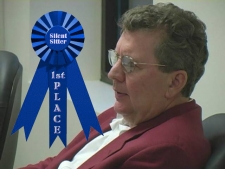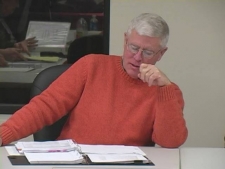Whatever one may think of John Martel, he consistently manages to come up with great one-liners. Mind you, they’re not going to be heard on the big movie screen anytime soon. They’re just pithy observations on the problems at Lake Holiday. We took the title of this post from his remarks on the issue of ordering tote bags for new owners for the Welcoming Committee.
Too many bags were ordered at a price double what they should have cost because the wrong person ordered the bags.
Wayne Poyer described the mix-up:
A batch of bags was ordered which, based on the rate of people coming into the community, it’s going to last about 40 years.
As Martel said: “this has to stop, this has to stop.” We’ll go out on a limb and guess that the Welcoming Committee only welcomes new homeowners and not new membership lot owners with one of the too many totes ordered at an exorbitant cost.

The budget review was made a little more difficult when it was discovered that one of Mike Kilmer’s staff incorrectly coded an expense item as an income item. Robin Pedlar thought Kilmer’s firm was “overpaid.” According to Martel, the distribution of work between the LHCC office and Kilmer’s firm has created problems. His view:
It’s hard to sort out who’s doing what to whom.
Kilmer’s firm is paid $4250 per month (an annual rate of over $50,000), and the board was reviewing other cutbacks to balance the budget at the May 15th budget meeting. Despite that, Pat Shields didn’t think that meeting was the appropriate time to address the value of Kilmer’s services.
In the video of overpaying for too many tote bags, Robin Pedlar worried:
If this is indicative of how phony all the numbers could be, it scares me.
She was not alone in her concern about sloppy accounting. Wayne Poyer asked somewhat rhetorically:
How bad is our accounting?
Let’s look at one area, the relationship between delinquencies and receivables. In our videos 2008 1Q Delinquencies and How Bad Is Our Accounting, Treasurer John Martel gave the numbers on delinquencies: 114 homes (including trash assessments), 70 water/sewer lots, and 242 membership lots. Based on LHCC’s published assessment rates, this is a monthly delinquency of $30,748.08. Yet the difference between LHCC’s reported accounts receivable in March and April of 2008 is only $9,299.73. If the delinquency rate is actually that high, why didn’t accounts receivable go up by a larger amount? If it’s not that high, why is the board over-stating the delinquency rate and budgeting based on this over-statement? As Poyer himself remarked, the delinquency report “just doesn’t pass the nonsense test.”
Budget-related videos from this meeting also include a discussion of getting foreclosing banks to pay their dues and a brief review of Kilmer’s role (which includes a little spat between a frustrated Martel and Suzy Marcus). A few unrelated topics were addressed after the budget review: creating the nominating committee; handling road violations, in which directors acknowledged that the roving patrol is not authorized to stop alleged violators; and relisting lots for sale with Oakcrest.

If you find it odd that in all this budget talk, the name of Steve Locke doesn’t come up much, we do as well. Steve’s resume says he’s a certified financial planner and a former member of the Financial Management Task Force. He had little to say about changes to the budget, a topic that is very relevant to his background and experience. What is the point of serving on the board if you don’t have much to say on the topic most directly related to your background or work experience? Congratulations, Steve. You’re our Silent Sitter for the May budget meeting.
With all of the excitement about accounting and budgets (a subject that caused Robin Pedlar to comment a little past the half-way point of the budget meeting that “we’ve got to move faster or I’m going home”), we realized that we neglected to announce our Silent Sitter winner for the April 28th meeting. The most important topic covered at the April 28th meeting was a proposal to refinance the clubhouse balloon note. In a meeting where directors openly acknowledged they breached their fiduciary responsibility, Suzy Marcus sat in almost total silence. She neither objected to the characterization expressed by several board members that the board (of which she was a member) had in fact breached its fiduciary responsibility or raised any concern about the cost to fix that mistake. Important issues require the input of all board members. Congratulations, Suzy. You’re our Silent Sitter for the April meeting.





